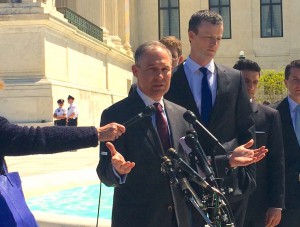
EPA Administrator Scott Pruitt reopened the review of tougher CAFE standards going into effect for 2025.
With the Environmental Protection Agency poised to release a proposal to revise the nation’s current fuel-economy standards, a big network of American businesses is calling on the Trump administration to maintain robust fuel-economy and emissions standards for passenger vehicles.
In a letter to EPA Administrator Scott Pruitt, CERES, which advocates for clean energy and sustainable business and industrial practices that minimize harm to the environment, also expressing support for rights of states to maintain the existing standards.
The letter from the Ceres BICEP Network to the EPA administrator noted the strong national miles-per-gallon and emissions standards already in place represent “a critical opportunity to strengthen the U.S. economy, enhance the global competitiveness of the auto industry, create jobs, and help us meet our climate goals.
“Weakening the National Program is not only legally unjustified but would also undermine these benefits and regulatory certainty,” the letter said.
(California wants 5 million zero emission vehicles on roads by 2030. Click Here for the story.)
The Ceres BICEP Network letter also expresses opposition to any attempts to undermine states’ rights to realize the benefits of the current federal standards by weakening them.
The current federal standards are consistent with standards that California and 12 other states, representing 35% of the U.S. market, plus Washington D.C. have adopted.
“We strongly support these states’ rights to protect their citizens and help them take advantage of the economic, health, and environmental benefits of cleaner, more efficient transportation,” said Anne Kelly, senior director of policy and the BICEP Network at Ceres.
The EPA is reconsidering the standards now on the books, which cover passenger cars, SUVs, and light trucks through model year 2025. A decision is expected within weeks.
The State of California, according to a report by Bloomberg, has proposed a compromise that would extend the phase in of the standards now on the books from 2025 to 2030 but it has been rejected by Pruitt, who wants to end the ability of states, particularly California, to set the standards.
(Click Here for more about plug-in vehicle sales surging past 1 million mark for first time.)
The EPA is expected to release its proposal, altering the existing rules, April 1.
Carmakers generally support reducing the fuel-economy standards. However, the have also been intent on avoiding getting caught in the middle of a dispute between California and Trump’s EPA.
The current rules were put in place in the closing days of the Obama administration in January 2017.
Ceres BICEP Network members represent $400 billion in annual revenue, and feature some of America’s foremost corporations, from Avon to General Mills to Mars, Incorporated to Unilever. They want the existing fuel-economy and emissions standards to stay in place.
“Keeping the current standards will strengthen the U.S. economy, save businesses and consumers money, enhance the global competitiveness of the U.S. auto industry, provide the regulatory certainty needed to spur innovation, reduce both our dependence on oil and climate risk, and create jobs,” Kelly added.
Kelly said the EPA is reconsidering fuel economy and emissions standards despite evidence that by establishing a level playing field and firm goals, consistent and enduring national standards are helping U.S. automakers and their suppliers stay competitive in an increasingly global market that continues to move toward greater efficiency and cleaner transportation.
An economic analysis by Ceres found that the current federal standards would reduce risk for the Detroit Three and benefit suppliers.
(To see more about some of the challenges of mass EV charging, Click Here.)
Weakening the standards could undermine industry economic performance, particularly for suppliers, who employ over two and a half times more Americans than the automakers, and who have relied on the national targets to make major investments in advanced automotive technologies that cut emissions and improve gas mileage, Kelly said.

I hope a group of automotive companies create a “Business Group” to screw with the federal regulations applicable to Avon, General Mills, Mars, and Unilever. What a propaganda piece by CERES.